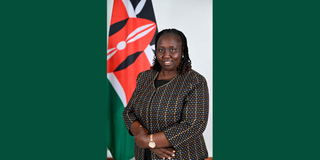Not all qualified women are qualified for all positions – and that's a truth we must embrace

Hannah Wendot Cheptumo, the newly appointed CS Gender, Culture, the Arts, and Heritage. Her femicide remarks during vetting struck a nerve with Kenyan women – and delighted some men.
What you need to know:
- Gender CS's victim-blaming comments during her vetting exposed a fundamental misunderstanding of GBV that makes her ill-suited for the position.
- Her appointment now demands she prove skeptics wrong by centering perpetrator accountability and structural reforms rather than victim responsibility in addressing Kenya's femicide crisis.
In a week that has seen our nation's attention fixated on parliamentary vetting, one moment continues to echo in my mind — and in the minds of countless Kenyan women.
When Hannah Wendot Cheptumo suggested during her vetting for the position of Gender Cabinet Secretary that femicide victims were primarily uneducated women or educated women "looking for money," adding that "a girl has many needs," a collective shudder ran through our gender desk. These weren't just ill-chosen words. They were a reflection of the very mind-set that has allowed gender-based violence (GBV) to persist in our society.
Words matter. And they matter most when they come from those seeking to lead our institutions.
Kenya is currently grappling with a femicide crisis of staggering proportions — 725 women killed last year alone, roughly 47 lives extinguished each week. Each woman was someone's daughter, perhaps someone's mother, sister, or friend. Each had dreams, aspirations, and an inherent right to safety that was violently stripped away.
What deeply concerned me about Cheptumo's testimony was the glaring omission at its core. When pressed on preventive strategies, she defaulted to the tired narrative of female responsibility — how women should modify their behaviour, limit their movements, and essentially shrink their lives to "avoid" violence. Conspicuously absent was any meaningful discussion of perpetrator accountability, intervention programs for men at risk of committing violence, or the structural reforms Kenya desperately needs: strengthened investigation protocols, specialised gender violence courts, properly resourced safe houses, and comprehensive prevention education. This approach reveals a fundamental misunderstanding of evidence-based violence prevention, which, as the WHO and UN Women have repeatedly demonstrated, must focus on addressing power imbalances and male behaviour change rather than restricting women's freedoms. Her comments inadvertently reinforced the very paradigm that gender policy must dismantle.
Scrolling through social media comments after our story on her vetting was published revealed a disturbing divide: while women expressed outrage, many men celebrated her comments as validation of their views. Some even declared she should be appointed immediately because "she understood her role." This reaction underscores the very challenge she now faces – a younger generation of men increasingly hostile to women's issues, seeing gender equality as a zero-sum game.
This raises a crucial question: Is Cheptumo the right fit for this particular docket? I don't doubt her legal credentials. But being a Gender CS requires more than professional qualifications – it demands someone with an innate understanding of systemic inequality, someone who has demonstrated unwavering commitment to gender justice, someone who can build bridges across Kenya's increasingly polarised gender discourse.
The ideal candidate would be a person whose first instinct isn't to shift responsibility to victims but to address root causes and perpetrator accountability. Someone who understands that gender work isn't just about women but encompasses boys and men too – not as opponents but as essential partners in creating a more equitable society. Someone who can transcend political interests to advocate fearlessly for all Kenyans regardless of gender.
I've witnessed too many scenarios where women are set up for failure by being placed in positions mismatched with their convictions, only to underperform and reinforce dangerous stereotypes about women in leadership. When this happens, anti-feminist voices grow louder: "See? Women can't lead." This pattern must end.
Qualified leaders
Yes, I celebrate having women in leadership positions. Reducing the gender gap in governance is crucial. But I firmly believe in appointing the right women to the right positions – not as tokens to tick boxes, but as qualified leaders positioned where their strengths can truly shine.
Parliament has made its decision. Now, Cheptumo faces the formidable task of regaining the trust of the very community she's been appointed to serve. Her job, as they say, is well cut out for her. The gender docket has numerous pending issues demanding immediate attention – from GBV to economic empowerment, from reproductive rights to political representation.
I hope she proves sceptics wrong. I hope she surrounds herself with advisors deeply versed in gender equality work. I hope she listens – truly listens – to rights organisations with decades of expertise.
Because in the end, the measure of her success won't be found in administrative achievements, but in whether all Kenyans – women, men, boys, and girls – feel seen, protected, and valued by their government.
Their lives depend on it.
dmuga@ke.nationmedia.com


